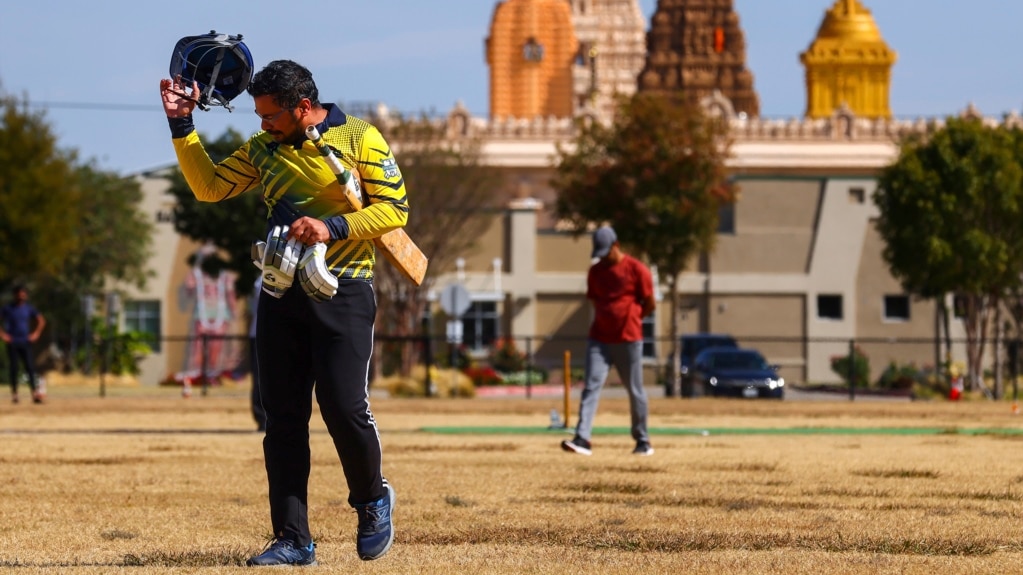Near a large Hindu religious building, the Karya Siddhi Hanuman Temple, a cricket game is in progress.
But the game is not taking place in India, where cricket is very popular. Instead, the game is taking place in the American state of Texas.
The cricket game and the Hindu temple are not far from Christian churches, cattle ranches and the Dallas Cowboys football team.
Over the last 10 years, the Dallas-Fort Worth area has had the highest Asian growth rate of any major U.S. metropolitan area. A metropolitan area is the urban area of a city and nearby towns or suburbs.
The U.S. Census Bureau estimates that Indians make up more than half the area’s Asian population increase. The Dallas suburb of Frisco alone has experienced growth similar to that of large American cities such as Seattle and Chicago.
While many Texans still love football, a growing number love cricket.
Kalyan “K.J.” Jarajapu, a volunteer at the temple who was watching a cricket game, said, “I never imagined that there would be...a cricket world like I saw back home in India here in (metro) Dallas.”
The American Community Survey is a program of the Census Bureau. The program shows that the percentage of Asians among foreign-born persons in the U.S. has risen recently. It has gone from 30 percent during the 2012-to-2016 period to 31 percent in the 2017-to-2021 period. At the same time, the percentage of immigrants from Latin America and Europe has gone down.
Immigrants from South Asia believe they have found good conditions in Frisco and other Dallas suburbs.
Hindu temples and Islamic centers
Texas-based students of Sri Ganapathy Sachchidananda Swamiji came together in 2008 to purchase a four-hectare piece of land in Frisco. They built a small Hindu temple there. Within three years, it was hosting hundreds of worshippers.
Jayesh Thakker, a temple trustee and joint treasurer for the India Association of North Texas, said they raised enough money to build a 3,065-square-meter temple in 2015. Nearly 30 workers came on special visas to make sure every detail honored Indian Hindu design traditions.
“They built it first as an American structure and then they ‘Indianized’ it,” Thakker said.
Indianize means to make something Indian – design, artwork, and so on.
The Islamic Center of Frisco has grown, too. Its leadership is planning to more than double the size of the 1,672-square-meter mosque by 2024. With more than 3,500 people attending prayers and 460 children attending Sunday school, the board moved to acquire more space in 2019.
Azfar Saeed, the center’s president, remembers that nearly 20 years ago only 15 people came to pray in a small space on any given day.
“At that time, nobody knew Frisco. People were like, ‘Where are you going?’” said Saeed, who was born in Pakistan. By 2010, “people just started moving...here,” he said.
Pandemic
The pandemic brought another change. Suddenly, people from California or Chicago were able to work remotely and live in different places.
The city of Houston, Texas, has had a large number of incoming Asians in the last 10 years. It has the second-highest growth rate after Dallas among major U.S. cities.
“The moment people went remote it felt like people were like, ’OK, I have a tiny house in California for $800,000 and I can buy a mansion here in Texas. Let’s go,’” Saeed said, laughing.
Influence
The influence of South Asian cultures is almost everywhere.
The movie theater in Frisco shows films in Telegu, Tamil and Hindi. At Tikka Taco in Irving, people can get tacos filled with foods such as tandoori chicken, lamb or paneer tikka.
Sometimes Indian politics appear in the Dallas suburbs. A number of people recently joined protests outside Frisco’s City Hall in support of Christians in India who claim a Frisco-based group supports Hindu nationalists threatening their churches.
However, Hanuman Temple now works with the City of Frisco for Holi. Holi is a yearly Hindu celebration also known as the Festival of Colors. People put colored powders on each other. The temple also organizes food donations, health fairs and other community services.
Laxmi Tummala is Hanuman temple’s secretary. Tummala said her group does not want to be apart from the wider community. “We don’t want to just be here and be isolated," she said.
I’m Ashley Thompson.
And I'm John Russell.
Terry Tang and Mike Schneider reported on this story for the Associated Press. John Russell adapted it for VOA Learning English.
_____________________________________________________________
cricket – n. a game played on a large field by two teams who try to score by hitting a small ball with a bat and then running between two sets of wooden sticks
ranch – n. a large farm especially in the U.S. where animals (such as cattle, horses, and sheep) are raised
suburb – n. a town or other area where people live in houses near a larger city
remotely –adv. to use online computers to work from a place other than an office
mansion –n. : a large and impressive house

